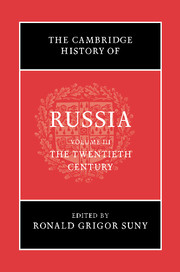Book contents
- Frontmatter
- Introduction
- 1 Reading Russia and the Soviet Union in the twentieth century: how the ‘West’ wrote its history of the USSR
- Part I Russia and the Soviet Union: The Story through Time
- 2 Russia’s fin de siècle, 1900–1914
- 3 The First World War, 1914–1918
- 4 The revolutions of 1917–1918
- 5 The Russian civil war, 1917–1922
- 6 Building a new state and society: NEP, 1921–1928
- 7 Stalinism, 1928–1940
- 8 Patriotic War, 1941–1945
- 9 Stalin and his circle
- 10 The Khrushchev period, 1953–1964
- 11 The Brezhnev era
- 12 The Gorbachev era
- 13 The Russian Federation
- Part II Russia and the Soviet Union: Themes and Trends
- Bibliography
- Index
- References
2 - Russia’s fin de siècle, 1900–1914
from Part I - Russia and the Soviet Union: The Story through Time
Published online by Cambridge University Press: 28 March 2008
- Frontmatter
- Introduction
- 1 Reading Russia and the Soviet Union in the twentieth century: how the ‘West’ wrote its history of the USSR
- Part I Russia and the Soviet Union: The Story through Time
- 2 Russia’s fin de siècle, 1900–1914
- 3 The First World War, 1914–1918
- 4 The revolutions of 1917–1918
- 5 The Russian civil war, 1917–1922
- 6 Building a new state and society: NEP, 1921–1928
- 7 Stalinism, 1928–1940
- 8 Patriotic War, 1941–1945
- 9 Stalin and his circle
- 10 The Khrushchev period, 1953–1964
- 11 The Brezhnev era
- 12 The Gorbachev era
- 13 The Russian Federation
- Part II Russia and the Soviet Union: Themes and Trends
- Bibliography
- Index
- References
Summary
The critical years from the turn of the century to the eve of the First World War were a time of uncertainty and crisis for Russia’s old political, social and cultural order, but also a time of possibility, imagination and daring. A chronological narrative of events is one way to retell this contradictory story. Still useful too is rehearsing the old debate about whether Russia was heading towards revolution in these pre-war years (the ‘pessimistic’ interpretation as it has been named in the historiography and in much classroom pedagogy) or was on a path, had it not been for the burdens and stresses of war, towards resolving tensions and creating a viable civil society and an adequately reformed political order (the ‘optimistic’ narrative). The conventional narrative of successive events and likely outcomes, however, suggests more coherence, pattern and telos than the times warrant. To understand these years as both an end time and a beginning, and especially to understand the perceptions, values and expectations with which Russians lived these years and entered the war, the revolution and the new Soviet era, we must focus on the more complexly textured flux of everyday life and how people perceived these experiences and imagined change.
History as event
The years 1900–14 are full of events marking these times as extraordinary years of change and consequence. In 1903, as part of the government’s ongoing efforts to strengthen the state by stimulating the expansion of a modern industrial economy, the great Trans-Siberian Railway was completed, symbolising both the growth of the railroad as an engine of industrial development (the driving idea of the minister of finance, Sergei Witte) and the imperial reach of the state.
- Type
- Chapter
- Information
- The Cambridge History of Russia , pp. 65 - 93Publisher: Cambridge University PressPrint publication year: 2006
References
- 1
- Cited by

